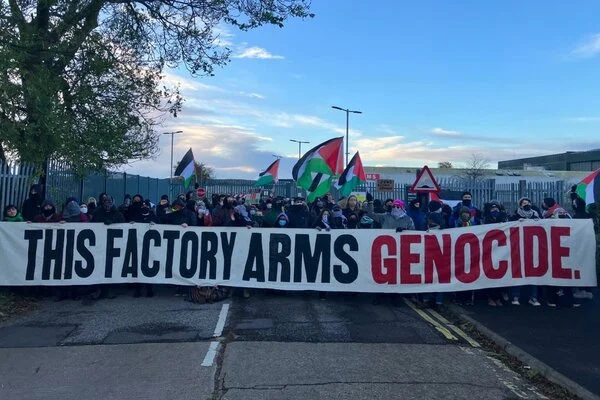Global Activism: Economic Boycotts Against Israeli Actions

Israel’s treatment of Palestinians has drawn widespread criticism and condemnation, with terms like “occupation,” “apartheid,” “siege,” and “ethnic cleansing” being used to describe its actions. The recent attack on Gaza further intensified the situation, bringing the phrase “collective punishment” into sharp focus.
Addressing Israel’s long-standing occupation requires a multifaceted approach, encompassing various strategies and tactics. Economic boycott is one such strategy that can be employed to support the Palestinian cause. By pressuring governments worldwide to impose sanctions on Israeli companies, businesses with ties to Israel’s economy, and the Israeli military and surveillance systems operating in occupied Palestinian territories, economic boycott can exert significant pressure to demand a ceasefire and promote a peaceful resolution to the conflict.
Activists in UK Just Shut Down a Factory That Makes Parts for Israeli Fighter Jets
Hundreds of activists have blocked the entrances to an arms factory in Kent, preventing workers and goods from entering. The newly formed group, Workers for a Free Palestine, organized the action and is demanding an immediate ceasefire in Gaza.
An organiser said, “As workers and trade unionists, we have the power to disrupt arms supplies to Israel. We’re taking this action because we will not stand by and let genocide happen with the backing of the British government and its arms industry.”
The Rochester facility of BAE Systems produces components for Israel’s cutting-edge F-35 fighter jet. In the beginning of this year, Israel acquired 25 more F-35 jets, increasing its total fleet to 75. It stands as the sole Middle Eastern country possessing these advanced and formidable aircraft, currently deployed in the ongoing conflict in Gaza. Over the past four weeks, Israeli military actions in Gaza have resulted in the loss of over 10,000 Palestinian lives, with more than 4,000 of them being children.
The organizer highlighted that the group’s activities are quickly gathering momentum, with nearly three times as many individuals participating this time. “There is a growing network of workers and trade unionists who want to organize in solidarity with Palestinians,” they said. “We will continue to escalate our actions until we see a ceasefire and an end to UK complicity in Israeli war crimes.”

Turkish institutions and public boycott pro-Israeli firms
The movement advocating for the boycott of Israel is gaining momentum in Turkey, as evidenced by organized sit-in protests at Starbucks stores nationwide, where participants wear scarves in the colors of the Palestinian flag. This surge has found support from official entities, starting with the State Railways of the Republic of Turkey (TCDD), followed by Turkish Airlines, the Turkish Parliament, and various municipalities in the country.
Given the multifaceted impact of Israeli actions on Palestinians living under occupation—ranging from physical and existential to spiritual—the significance of the boycott intensifies as ethical and moral considerations intertwine with economic ones.
Turkey serves as a notable example of the expanding reach of the boycott movement, now involving various institutions and government bodies. According to Samia Al Botmeh, “The impact of the boycott will always remain very weak, symbolic, and inconsistent if the popular pressure does not turn into governmental action.”
The official decision of the Turkish State Railways company (TCDD) to cease selling Starbucks products in its dining cars underscores this endorsement, with Ufuk Yalcin, the general manager of TCDD, attributing the move to the brand’s mistreatment of its pro-Palestinian workers in the US and the atrocities committed against Palestinians in Gaza.
Muhannad Ayyash echoes this sentiment “When large institutions join with individuals in boycott activities, it sends a clear message to other companies that being complicit in genocide will have economic consequences.”
Firm in Kerela, India Won’t Accept Orders for Supply of Israel Police Uniforms Until War Ends
Kerala-based apparel firm Maryan Apparel Pvt Limited, a supplier of uniforms for Israel’s police force since 2015, has decided not to accept new orders until the conflict in Gaza ceases. The decision stems from the firm’s concern over the ongoing violence, including killings, bloodshed, and hospital bombings, impacting innocent civilians in Gaza. While honoring existing contracts as per international agreements, the company aims to make a moral stand against the atrocities. Maryan Apparel, established in 2006, specializes in producing uniforms for various entities globally, including army personnel, police, security officers, and health service workers, and will temporarily halt new orders until the war concludes.

- Art
- Causes
- Best Offers
- Crafts
- Dance
- Drinks
- Film
- Fitness
- Food
- Games
- Festival
- Gardening
- Health
- Home
- Literature
- Music
- Networking
- Other
- Party
- Religion
- Shopping
- Sports
- Theater
- Wellness



